Coconuts, a gift of Nature
Coconuts, a gift of Nature
Coconut presents in almost menus. It is a natural source of nutrients that are very good for health, such as antioxidant, antibacterial, and blood sugar benefits. Coconut products are also very easy to find on almost all the shelves in shops, supermarkets and traditional markets.
The coconut tree is native to Southeast Asia and the islands between the Indian and Pacific Oceans. Today, coconuts are grown all over the world and are becoming increasingly popular for their taste, culinary uses, and many potential health benefits.
Everyone though coconut is a fruit, but nope, it is a single-seeded drupe. A drupe is a fruit that has a hard shell on the seed, such as a peach or cherry. Or like walnuts, almonds and pecans are drupes like coconuts, but we usually call them nuts.
The coconut not just gives the natural coconut water available in it, but also the white meat which can be eaten immediately like apple, guava ... it also gives us a lot of interesting dishes such as coconut oil, coconut cream, coconut milk and dried coconut.
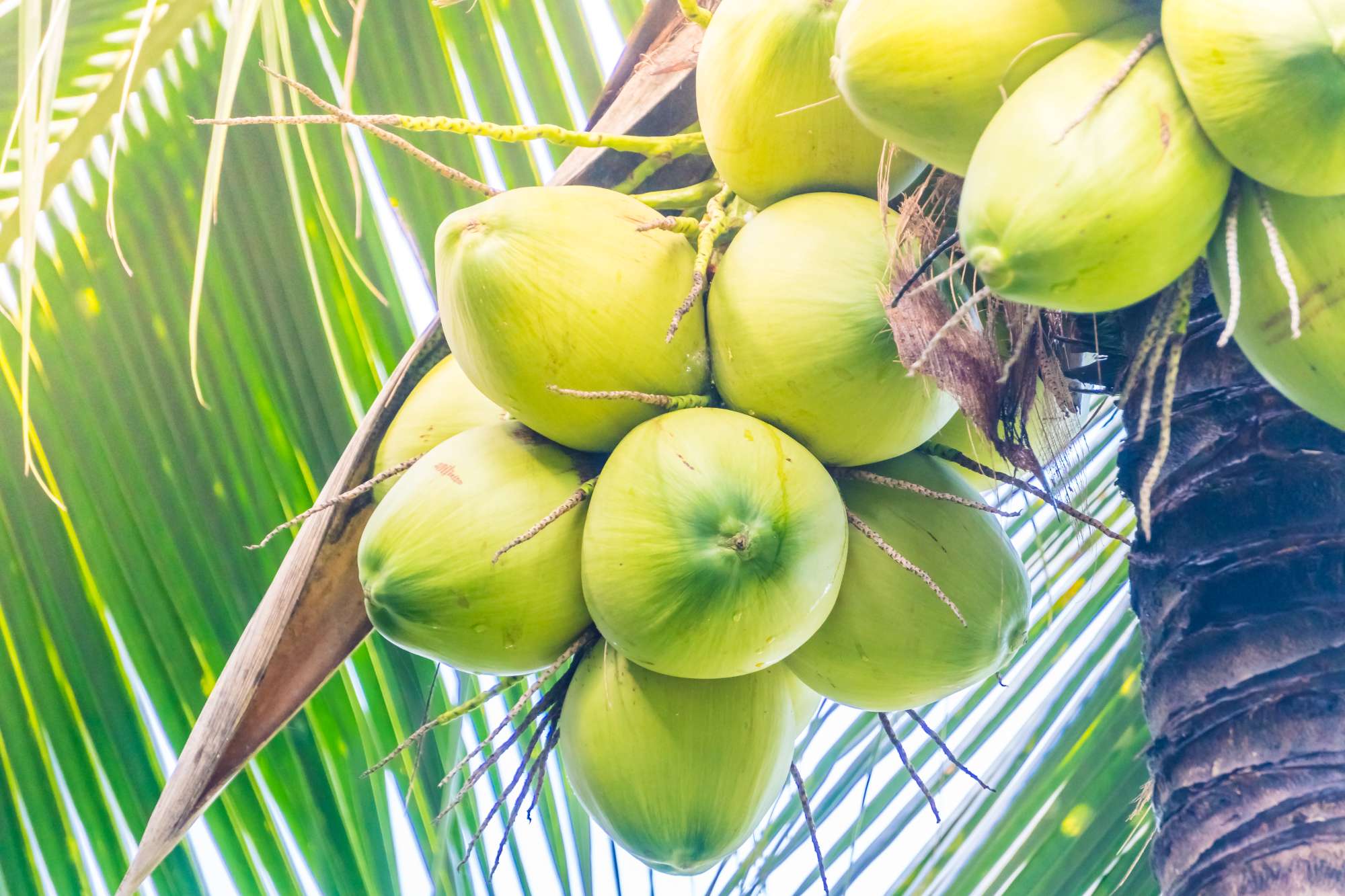
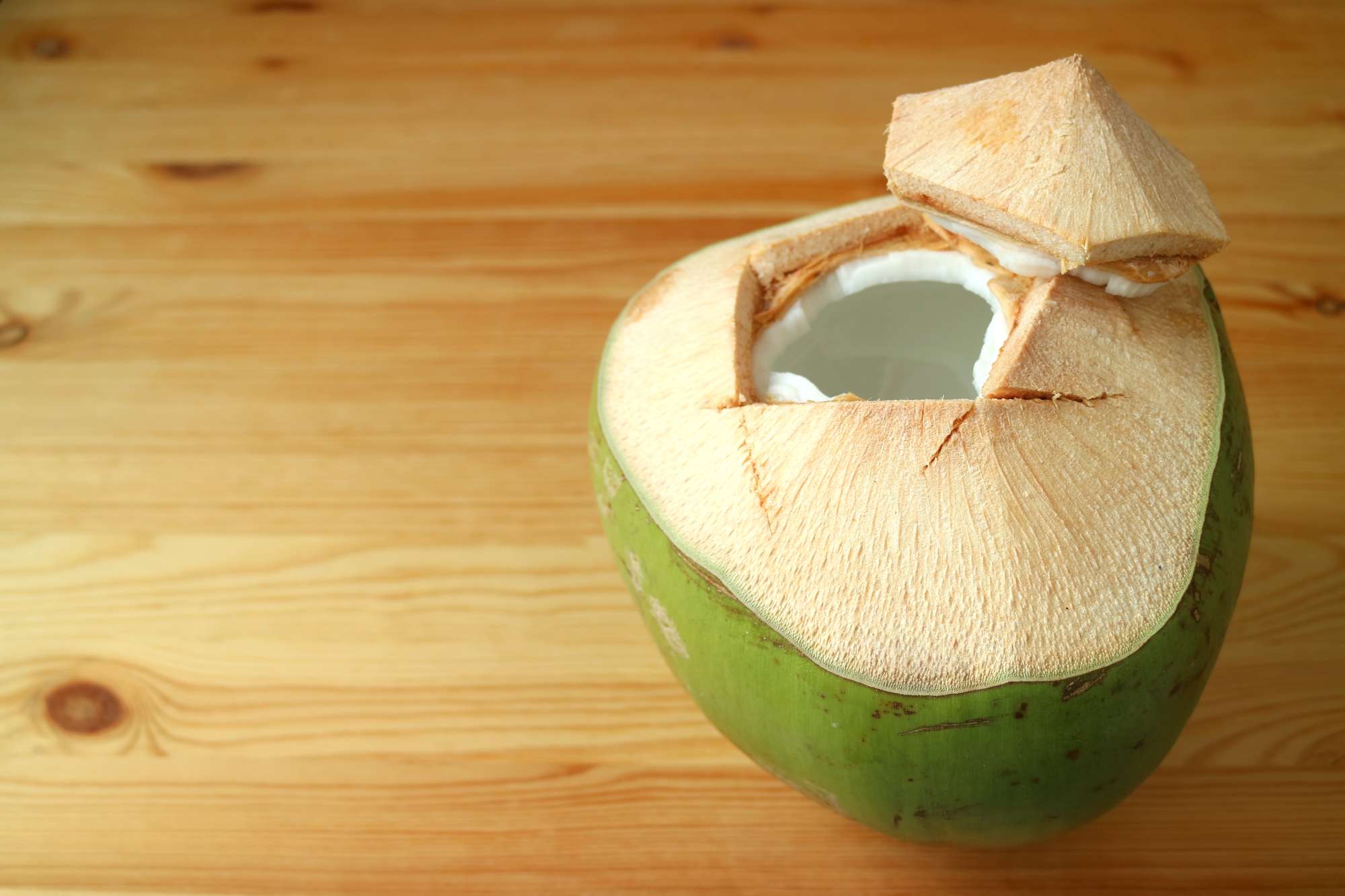
NUTRITION IN COCONUT FRUIT
1. Coconut Water Nutrition Facts
One cup of 100% coconut water (245g) provides:
- Calories: 44
- Fat: 0g
- Sodium: 64mg
- Carbohydrates: 10.4g
- Fiber: 0g
- Sugars: 9.6g
- Protein: 0.5g
- Vitamin C: 24.3mg
- Potassium: 404mg
2. Nutrition facts in 100 grams of coconut meat
| In 100 grams | Fresh coconut meat | Unsweeted dried coconut meat |
| Calories | 354 | 660 |
| Protein | 3grams | 7grams |
| Carbs | 15grams | 24grams |
| Fiber | 9grams | 16grams |
| Fat | 33,5grams | 64,5grams |
| Manganese | 65% giá trị hàng ngày (DV) | 119% DV |
| Copper | 48% DV | 88% DV |
| Selenium | 18% DV | 34% DV |
| Magnesium | 8% DV | 21% DV |
| Phosphorus | 9% DV | 17% DV |
| Iron | 14% DV | 18% DV |
| Potassium | 8% DV | 12% DV |
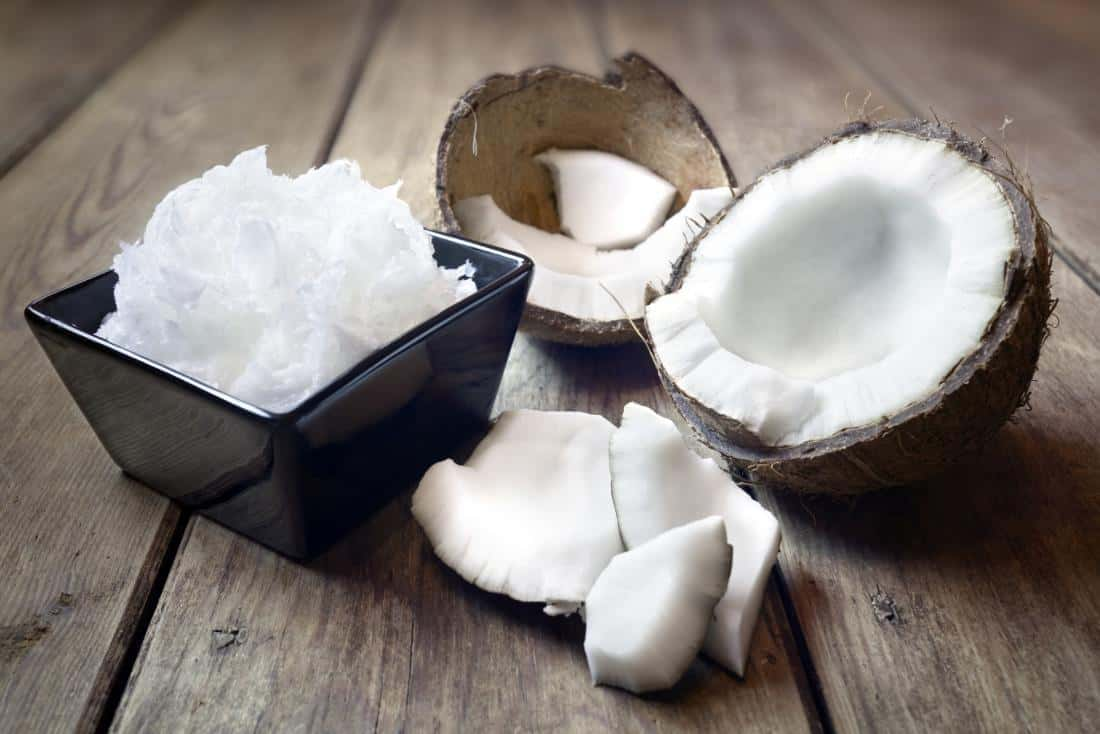
Fresh coconut meat
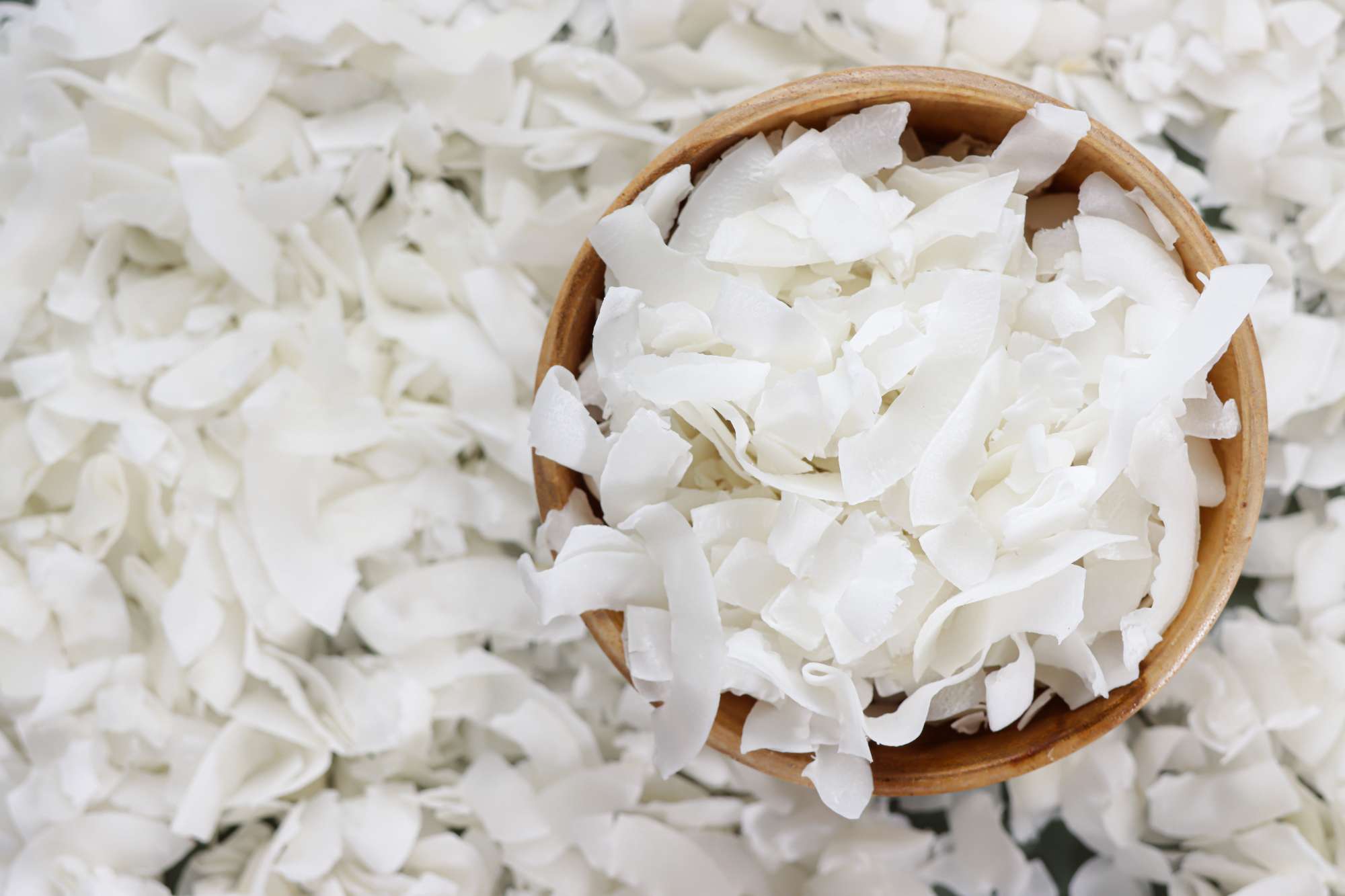
Unsweeted dried out coconut meat
Coconut is especially high in manganese, which is essential for bone health as well as the metabolism of carbs, protein, and cholesterol. Coconut is rich in copper and iron, which help form red blood cells. And, it also have selenium which is an important antioxidant that helps protect your cells.
In particular, coconuts aren't like many other fruits, most of them contain a lot of carbs, but coconut mainly provides fat. Most of the fat in coconuts is in the form of medium-chain triglycerides (MCTs for short). The body metabolizes MCTs differently than other types of fat. MCTs are absorbed directly from the small intestine and be use quickly for energy. In a review about the benefits of MCTs in people with obesity, it was found that these MCTs promote body fat loss as eating in place of long-chain saturated fats from animal foods. However, more research is needed to assess whether the potential benefits associated with MCTs apply to coconut oil.
3. Nutrition facts comparison table
Coconut fruit provides some liquid forms that are available in the form of coconut milk or coconut water.
| Products: | calo | carbs | sugar | fat | fiber | protein |
| Shredded sweetened coconut (100g) | 500 | 48g | 43g | 35g | 4,5g | 2,9g |
| Unsweeted dried out coconut meat (100g) | 654 | 24,5g | 7.35g | 63g | 16g | 7g |
| Coconut milk (100g) | 31 | 2,9g | 2,5g | 2,8 | 0g | 0,2g |
| Coconut water, unsweetened (100g) | 18 | 4,2g | 3,9g | 0g | 0g | 0,2g |
| Coconut oil (1tsp, 11,6g) | 104 | 0,1g | 0g | 11,5g | 0g | 0g |
| Coconut cream (30g) | 107 | 16g | 15,4 g | 4,9g | 0,1g | 0,4g |
FRESH COCONUT MEAT AND DRIED OUT COCONUT MEAT
The difference that you need to know between Fresh coconut meat and dried out coconut meat. With most of the water is removed from coconut meat during the drying process, dried out coconut meat has a higher concentration of sugar, calories, and fat than fresh coconut meat. And, to keep the dried out coconut meat from being a perishable, preservatives and whiteners are often added. So the nutritional composition of these two types of coconut meat will certainly be different, even the taste of fresh coconut will also change.
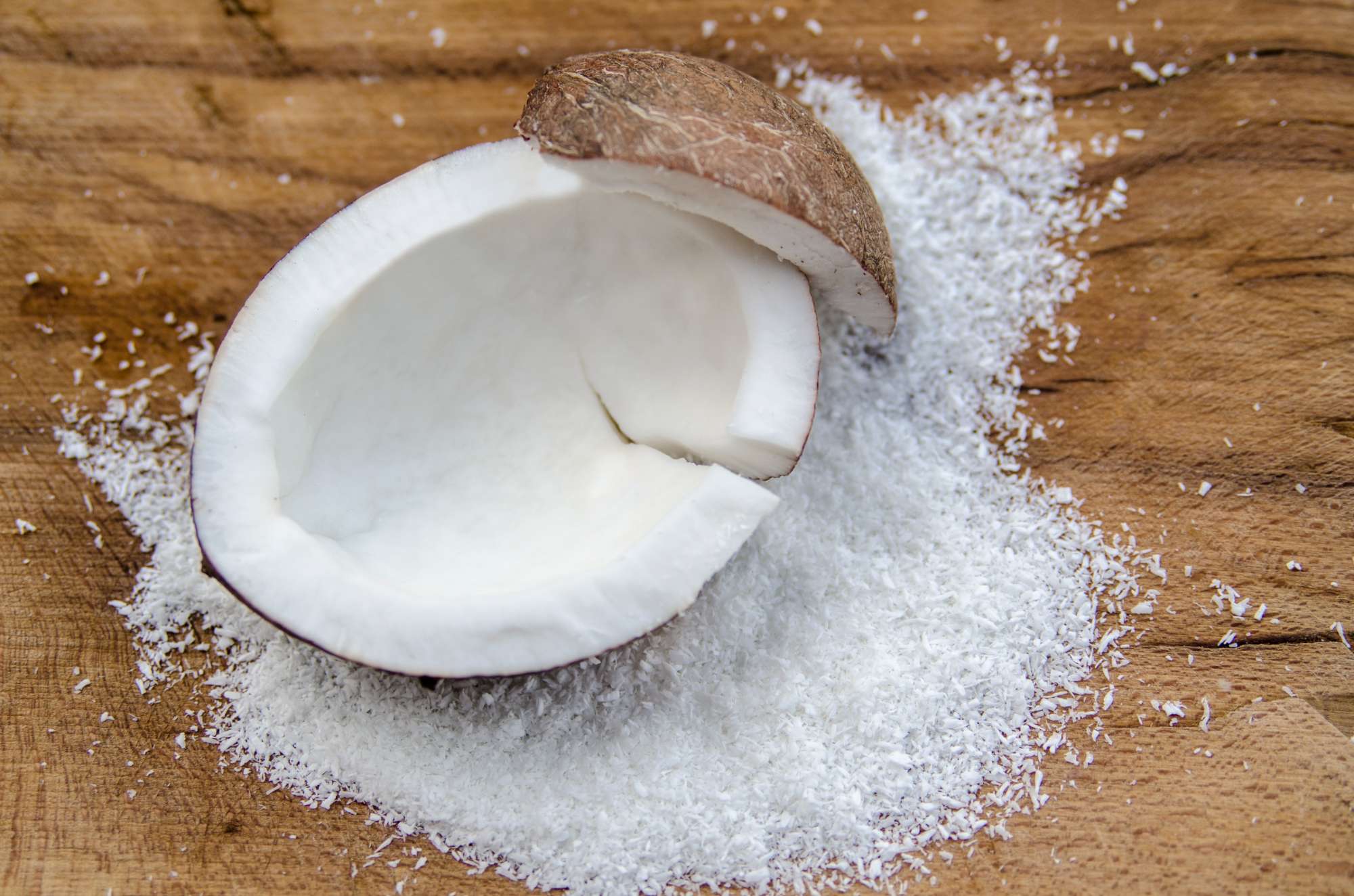
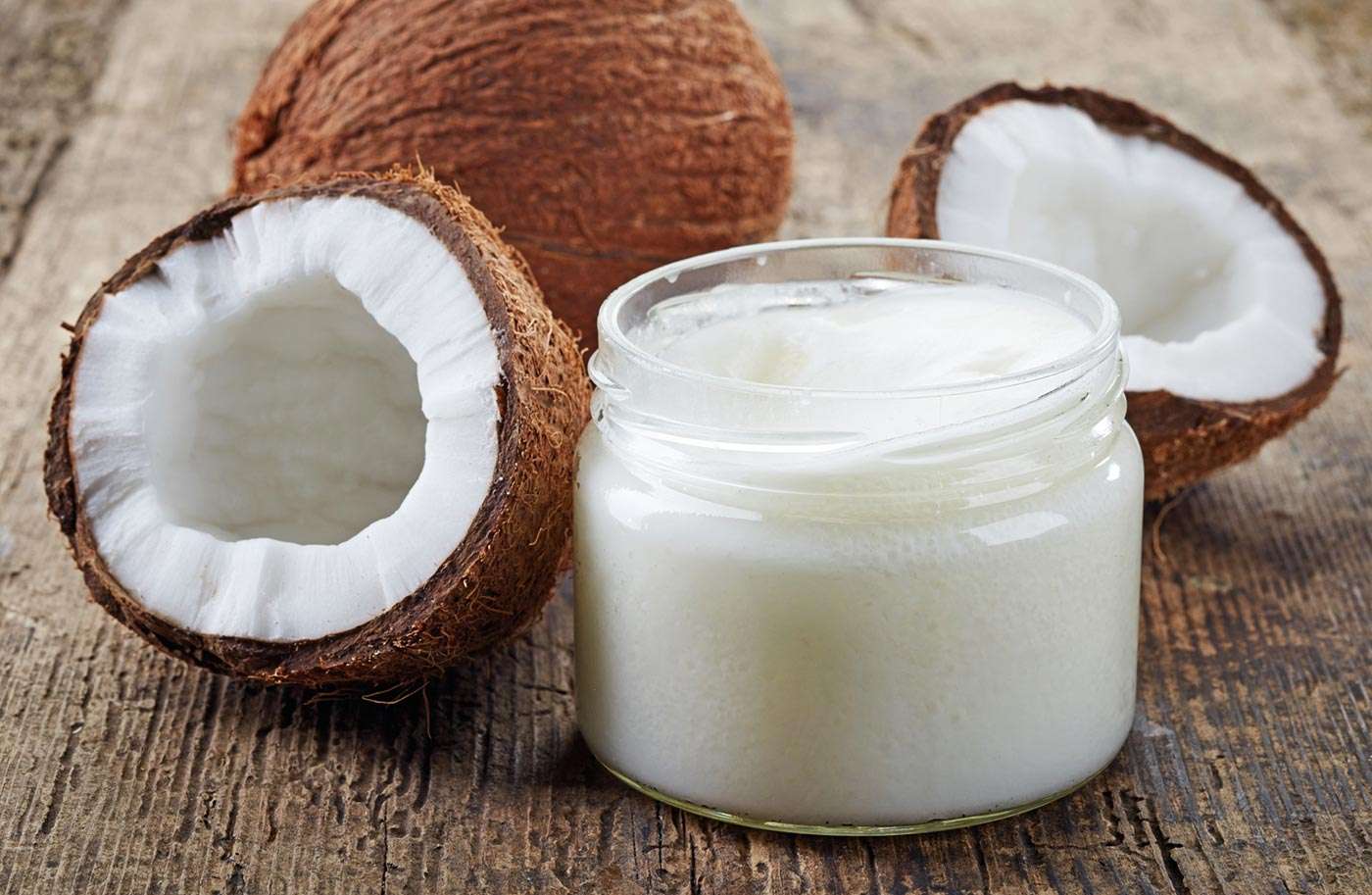
HEALTH BENEFITS FROM COCONUT
1. Antibacterial ability
Several test-tube studies and several involvinghuman studies suggest that coconut oil can reduce the growth of several different types of bacteria.
For example, one test-tube study found that virgin coconut oil inhibited the growth of Staphylococcus aureus, a type of bacteria that causes staph infections.
Another study involving 50 children found that swishing the mouth with coconut oil after brushing was as effective as chlorhexidine, a common antiseptic, in reducing the growth of Streptococcus mutans.
Another test-tube study also demonstrated that an emulsion containing coconut oil and water was effective against Staphylococcus cholermidis and Escherichia coli, two strains of bacteria associated with foodborne illness.
2. Contains powerful antioxidants
Coconut meat contains phenolic compounds, which are antioxidants that can help protect cells from oxidative damage. The main phenolic compounds identified include: gallic acid, caffeic acid, salicylic acid, p-coumaric acid. Lab tests on coconut meat have shown that it can neutralize harmful compounds called free radicals, which contribute to chronic disease.
According to another test-tube study, certain antioxidants in coconut could even help protect against DNA damage (26Trusted Source).
What’s more, some test-tube and some animal studies have also shown that antioxidants found in coconut oil may help protect cells from damage and death caused by oxidative stress and chemotherapy.
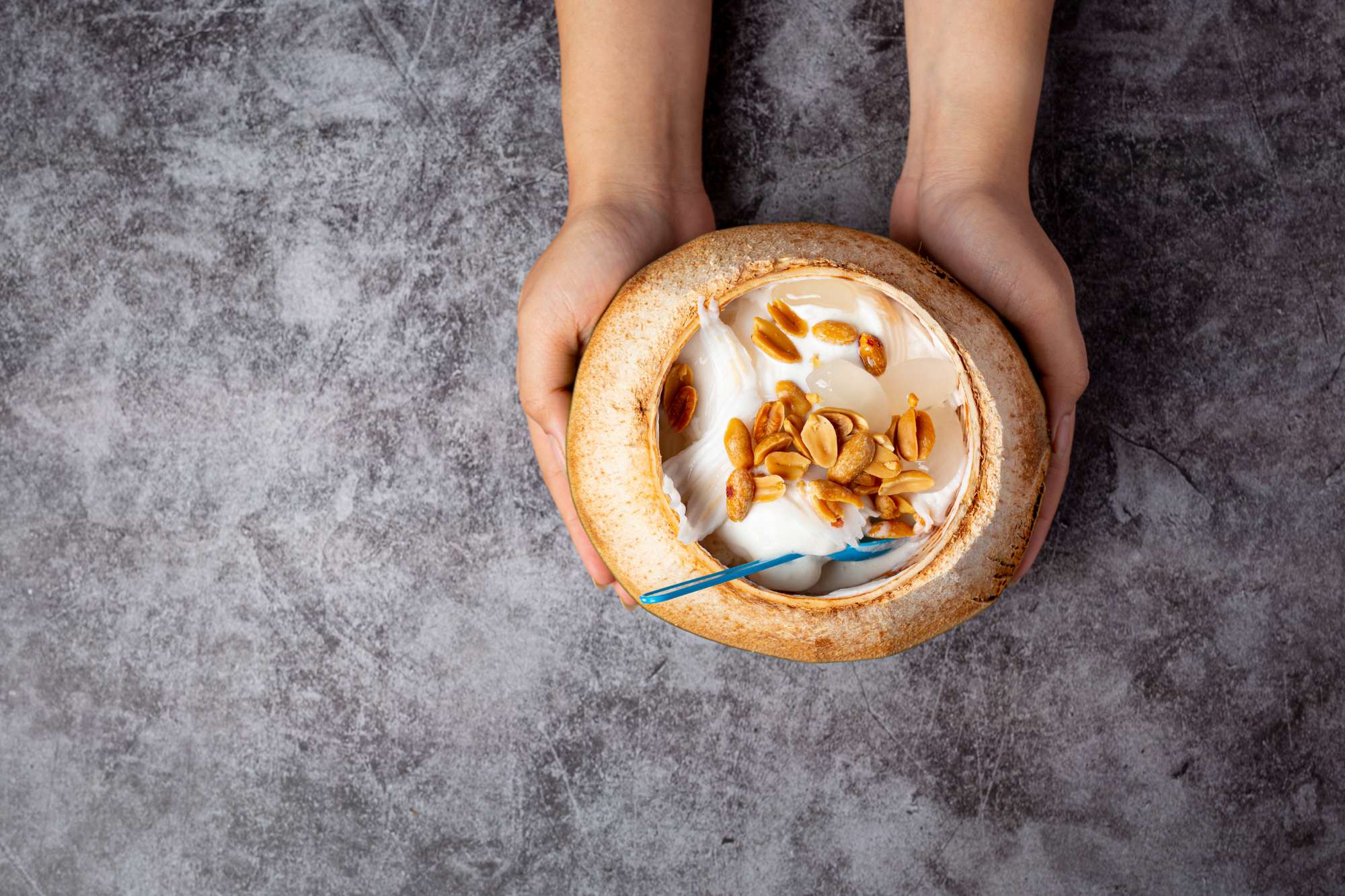
3. Promote blood sugar control ability
Coconuts are low in carbs and high in fiber and fat, which may be beneficial for blood sugar control.
One review even suggested that coconut oil may help lower blood sugar levels, which may be due to its anti-inflammatory properties and antioxidant content. Another study involving 48 people with metabolic syndrome found that replacing other fats in the diet with virgin coconut oil improved triglyceride levels and reduced fasting blood sugar after 4 weeks compared to a control group.
The high fiber content of coconut meat can also help slow digestion and may potentially improve insulin resistance, which can help regulate blood sugar levels as well.
On the other hand, one recent review concluded that adding coconut fat to meals could actually increase insulin resistance long term, which could worsen blood sugar control. Therefore, more research is needed to better understand the effect of coconut on blood sugar regulation.
4. Improves Cholesterol Levels
The fat in coconut comes primarily from lauric acid, a medium-chain fatty acid. This type of fat breaks down faster and does not accumulate in the bloodstream as much as the long-chain fatty acids found in meat and dairy products.
Medium-chain saturated fatty acids are directly absorbed from the intestine and sent straight to the liver to be rapidly used for energy production. They do not aid in the biosynthesis and transport of cholesterol. For this reason, some believe that coconut can decrease "bad" LDL cholesterol. But research has shown that coconut oil can raise your LDL cholesterol. One study found that coconut oil raised LDL cholesterol less than butter but significantly more than unsaturated plant oils.
However, there is some potentially positive evidence regarding coconut oil and HDL levels. HDL cholesterol is considered to be "good" cholesterol. Some studies have found that consuming coconut oil can boost HDL levels. Researchers suggest that the HDL increase may be due to the high lauric acid and myristic acid levels in coconut.
5. May Reduce Blood Pressure
A small study in humans showed a reduction in blood pressure with increased coconut water consumption. This may be related to the potassium provided by coconut water; low potassium intake increases the risk of hypertension.
6. May Help Balance Electrolytes
Some coconut water fans like it as a sports drink. It provides electrolytes (sodium, potassium, calcium, and magnesium) and carbohydrates to help improve muscle function, with fewer calories than a typical sports drink, and is gluten-free.
However, you can get the same benefits from consuming whole foods, like a potassium-rich banana, with water. Whole foods have no hidden ingredients (like added sugar) and are generally cheaper than sports drinks or recovery bars.
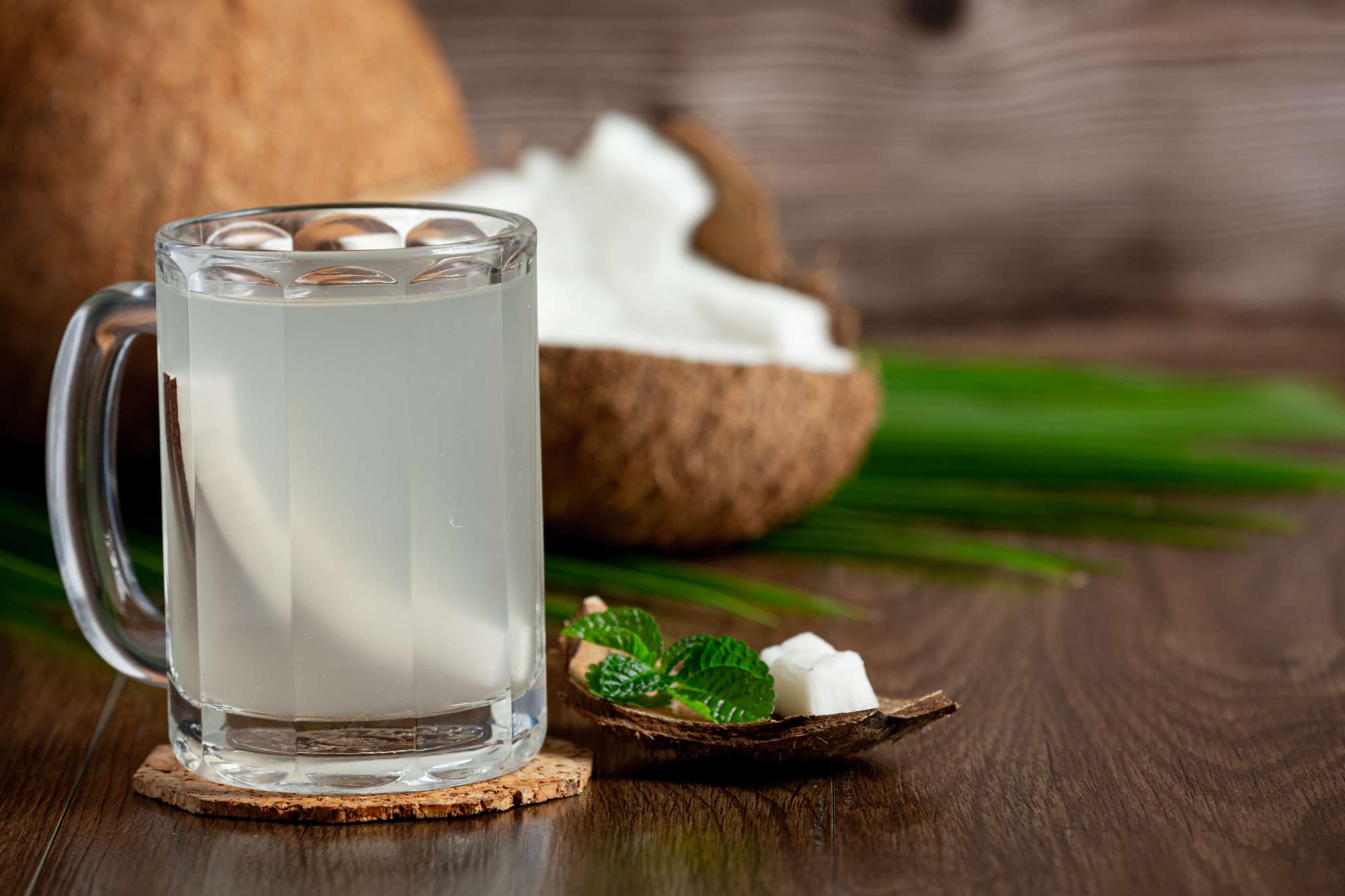
7. May Lower Dementia Risk
Some research has investigated the protective effects of coconut oil and MCFAs on the brain. There is preliminary evidence that coconut oil, MCFAs, and their derivatives may influence risk factors related to Alzheimer's disease.
8. May Promote Weight Loss
Many fans of coconut and coconut oil claim that it can help reduce body fat. A 2018 review of studies supported certain weight-loss-related claims, suggesting that the medium-chain triglycerides in coconut and coconut oil could enhance fat burning, increase energy expenditure, and even suppress appetite, but only if included as part of a low-fat diet.
Another analysis of studies published in 2015 compared consumption of medium-chain triglycerides (MCTs), such as those found in coconut oil, with long-chain triglycerides (LCTs) for weight loss. Study authors concluded that replacing LCTs with MCTs in the diet could potentially induce modest reductions in body weight and composition.
Study authors noted, however, that further research is required by independent research groups using large, well-designed studies to confirm these findings and to determine the dosage needed for the management of healthy body weight and composition.

ADVERSE EFFECTS
Although potassium is an essential mineral, consuming too much of it can lead to hyperkalemia (an overabundance of potassium in the blood). Since coconut water contains potassium, drinking large quantities could cause this issue. This is unlikely to happen for most people, but those who have chronic kidney disease or take medications, including ACE inhibitors, should be cautious.
Coconut water is also high in FODMAPs, a group of carbohydrates that can cause or worsen digestive symptoms in people with irritable bowel syndrome (IBS). People following a low-FODMAP diet may need to limit or avoid coconut water if it causes symptoms for them.
POTENTIAL DRAWBACKS
Because coconuts are so high in fat, they are also high in calories. Depending on your calorie needs and intake, they might promote weight gain if you don’t account for the extra calories elsewhere or make adjustments to your diet.
Furthermore, some research shows that coconut oil can increase LDL (bad) cholesterol levels, which is a risk factor for heart disease. While studies show that saturated fat consumption is not directly associated with a higher risk of heart disease, some health organizations, including the American Heart Association, recommend limiting your intake to less than 5–6% of total daily calories.
Therefore, it’s best to enjoy coconut oil in moderation as part of a balanced diet, alongside a variety of other healthy fats like olive oil.
You should also be sure to address any concerns with your healthcare professional before adding coconut to your diet, especially if you have high cholesterol levels or are at risk of developing heart disease.
Additionally, some people are allergic to coconuts, though this is rare. If you have this allergy, you should avoid consuming all coconut-derived products.
CAN DRINK COCONUT WATER EVERY DAY?
Coconut water is often considered a safe drink, providing a delicious natural source of electrolytes. But if you have a health condition that requires limiting your potassium, sodium, or calorie intake, then coconut water may not be the right drink for you.
1. For people with chronic kidney disease, potassium intake should be limited. Although potassium is good for the body, but with the kidneys are damaged, it cannot get rid of the excess potassium. Excess potassium can lead to a condition called hyperkalemia, which is when the amount of potassium in the blood is dangerously high.
2. In a glass of coconut water about 230ml contains about 101 milligrams of sodium. A high-sodium diet can lead to high blood pressure. High blood pressure over a long period of time can lead to kidney damage and heart disease. Sodium can also interact with blood pressure medications.
3. Also in a glass of coconut water about 230ml contains from 45 to 60 calories. If your doctor has recommended a low-calorie diet, then another beverage other than coconut water would be a better choice.
EASY TO ADD TO YOUR DIET
Coconut is versatile in the kitchen and works well in both sweet and savory foods. It’s a great choice for those on low carb, paleo, gluten-free, or nut-free diets.
Flaked or shaved, coconut adds a nice flavor to savory dishes. Its meaty texture and flavor work well in curries, fish stews, rice dishes, or even on breaded shrimp.
Be aware that some brands contain added sugar, which you may not want for savory dishes, so be sure to check the ingredient label carefully.
Shredded coconut is great for baking and adds a touch of natural sweetness and moisture to cookies, muffins, and quick breads.
A sprinkle of raw coconut adds texture and a tropical flavor to oatmeal. Stirred into pudding or yogurt, it’s also a delicious calorie booster for someone who wants to gain weight.
Coconut flour is used in baking as a substitute for wheat flour. It’s gluten-free, nut-free, and a popular option for anyone who’s counting carbs. Because it’s grain-free, the flour is also good for those on the paleo diet, which does not allow grain products like regular wheat flour. However, coconut flour is best used in recipes that have been tested, as it won’t rise like wheat flour and absorbs more liquid than other types of flour.
Coconut oil is a delicious heat-stable fat that can be used in place of other oils for baking, sautéing, or roasting.
Compiled and penned by Crocus Media
Products

Desiccated Coconut
Desiccated coconut is mainly used as an ingredient in confectionery and bakery industry. It’s used in making cookies, cakes, pastries, desserts, puddings, or any other coconut based recipes.


.jpg)
.jpg)